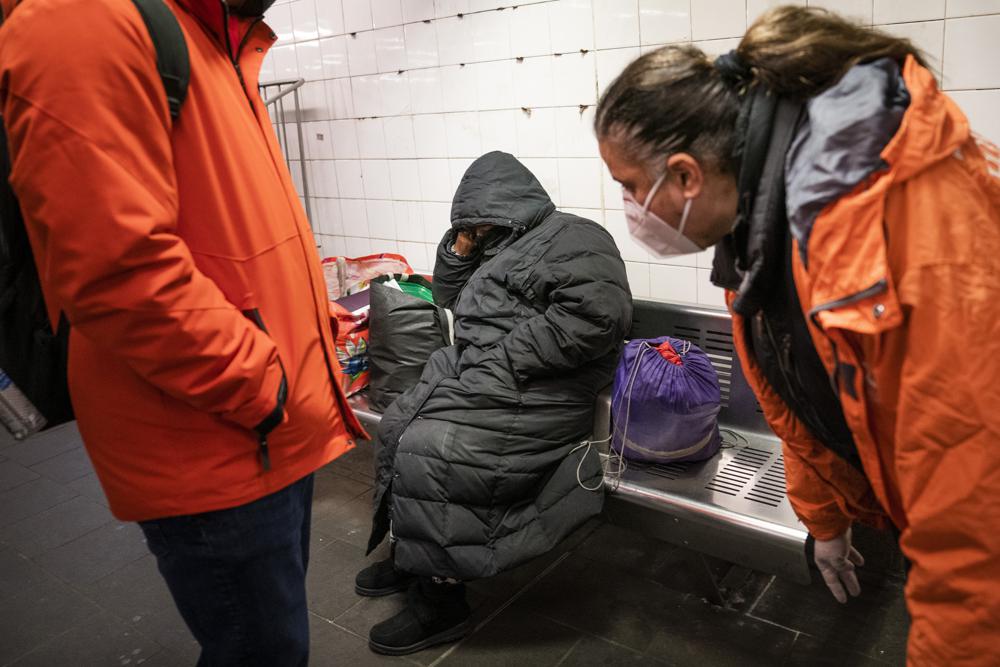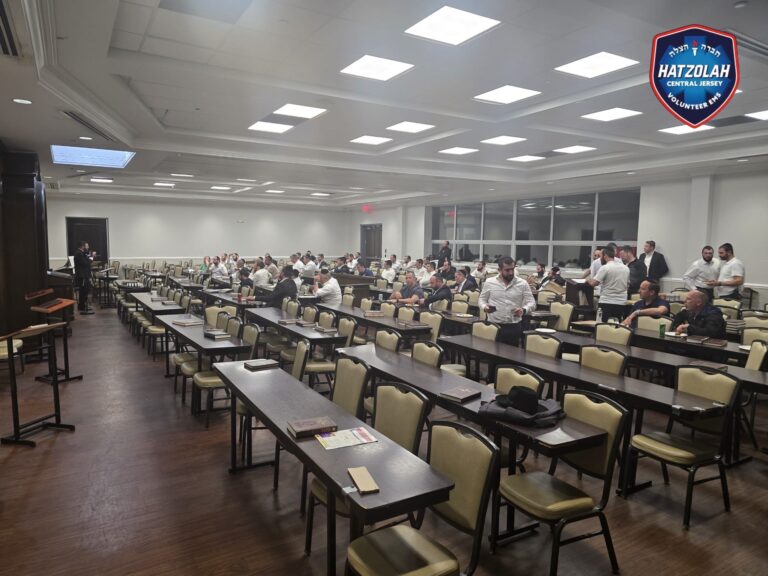Bidding to address a mental health crisis on New York City streets and subways, Mayor Eric Adams announced Tuesday that authorities would more aggressively intervene to get people into treatment, describing “a moral obligation” to act, even if it means involuntarily hospitalizing some.
“These New Yorkers and hundreds of others like them are in urgent need of treatment, yet often refuse it when offered,” Adams said at a news conference, noting that the pervasive problem of mental illness has long been out in the open.
“No more walking by or looking away,” the mayor said.
The mayor’s directive marks the latest attempt to ease a crisis decades in the making. It would give outreach workers, city hospitals and first responders, including police, the discretion to involuntarily hospitalize anyone they deem a danger to themselves or unable to care for themselves.
“The very nature of their illnesses keeps them from realizing they need intervention and support. Without that intervention, they remain lost and isolated from society, tormented by delusions and disordered thinking. They cycle in and out of hospitals and jails.”
State law generally limits the ability of authorities to force someone into treatment unless they are a danger to themselves, but Adams said it was a “myth” that the law required a person to be behaving in an “outrageously dangerous” or suicidal way before a police officer or medical worker could take action.
As part of its initiative, the city is developing a phone line that would allow police officers to consult with clinicians.
The mayor’s announcement was met with caution by civil rights groups and advocates for the homeless.
A coalition of community groups, including the Legal Aid Society and several community-based defender services, said the mayor was correct in noting “decades of dysfunction” in mental health care. They argued state lawmakers “must no longer ‘punt’” to address the crisis and approve legislation that would offer treatment, not jail, for people with mental health issues.
“We are heartened to hear that Mayor Adams acknowledges that community-based treatment and least-restrictive services must guide the path to rehabilitation and recovery,” the groups said.
The mayor said he has begun deploying teams of clinicians and police officers to patrol the city’s busiest subway stations.
In addition, the city is rolling out training to police officers and other first responders to help them provide “compassionate care” in situations that could cause the involuntary removal of a person showing signs of mental illness in public places.
“It is not acceptable for us to see someone who clearly needs help and walk past,” Adams said in announcing the program.
“We can no longer deny the reality that untreated psychosis can be a cruel and all-consuming condition that often requires involuntary intervention, supervised medical treatment, and long-term care. We will change the culture from the top down and take every action to get care to those who need it.”
(AP)












8 Responses
Nice to see a policy change that may actually make a difference in the rising rates of crime and homelessness.
I wonder if this can be or intended as a way to get around the zero bail law. If a criminal can be judged to be mentally unstable then he can be locked up for treatment rather than being set loose on the streets to prey on more innocent victims.
Only a matter of time before others are deemed mentally ill, far beyond the homeless. Social media posts going against the government narrative, traditional religious and family values characterized as ‘hate’ because alternative lifestyles are excluded – these are also “dangerous” for themselves and society, right?
FINALLY!
This probably requires an act of the state legislature (or even a constitutional amendment). The problem is that once you take someone into custody (against their will), the civil rights protections in the Bill of Rights have to be dealt with. Plus, police have a very bad record of dealing with insane people.
@TYW
You’re absolutely right. We have already seen that parents who disagreed with the Leftist agenda were labeled “Domestic terrorists” by the Biden DOJ.
I don’t know if that means we should ignore the real crisis of mental illness among the homeless, but the issue you raise is very important.
To those out there who think this is a great Idea.
Have you ever been committed involuntarily or even been in a psychiatric unit? I’m guessing not.
Are there specific criteria to be committed involuntarily under this new act? Or is the criteria being homeless? Yes, a lot of the homeless suffer from mental illness, but for a lot outpatient resources would be more than helpful enough. Most people who are homeless are homeless due to poverty. Did you know that? Does being homeless maybe increase the possibility for mental health issues? Probably, I mean I’d be very anxious and possibly depressed if I lived on the street. And if someone already has mental issues, well, being homeless probably makes it worse and nearly impossible to manage. That doesn’t mean they are dangerous. NYC has a crime problem; mental health issues may be at its core.
I fully agree that we need to do more to help people with mental illness. However, involuntary commitment is just as bad as jail, if not worse. For those of you who have been to such units (surprise, it happens in our sheltered community as well) it as almost always traumatic and does little if any long term good yet adds a host of new traumas to the picture.
What I don’t understand is, if the government has so much free money (hospitalizations cost a fortune) to help individuals (who are homeless and or have mental illness), why don’t they actually help, like provide outpatient resources to these individuals on a voluntary basis and actually help with housing? It would be a lot cheaper and actually help in the long run. Or is the goal just for NYC to seem prettier and cleaner so that real estate price don’t tumble? Just some questions, you know.
Peacho:
I understand the concerns about the potential for abuse in involuntary commitment. But is it better to do nothing, as they’ve been doing until now? There are, on rare occasions, people who are jailed for crimes they didn’t commit. Does that mean we should abolish the entire justice system and let everyone go free?
As for your idea of the city opening outpatient services to be used on a voluntary basis, that’s wishful thinking at best. Do you really think the drug-addled homeless guy sleeping on the subway bench is going to voluntarily go to weekly appointments to see a social worker? Aside from that, I’m sure there are existing resources for people to avail themselves of if they want to.
I also find it pretty cynical to assume that the only reason to want to clean up the city streets is for aesthetic or financial reasons. I think the average citizen has a right to be able to walk the streets without having to worry about being accosted by a homeless guy looking for his next fix.
DontMindMe:
You have made some good points.
I’m not saying nothing should be done, but as someone who has dealt with involuntary commitment I can say with certainty – it very rarely helps and most often leaves long term trauma. Which kind of doesn’t help in “cleaning up the streets”.
And regarding jailing innocents, that is a tremendous issue. No innocent human should have to go through that.
I don’t know if you know how much hospitalizations cost, but they’re a fortune. One night (hospitalized) with little to no treatment or tests will run you a few thousand. I am pretty certain that NYC is not footing the bill. So it comes to question, how are these individuals who are being held against their will, who can’t afford a basic roof over their head going to afford this?
A lot of people think that people who suffer from addiction don’t want help, it’s just not true. Addiction treatment is hard, mentally, emotionally, and physically. And when people get proper support and treatment they can and want to do well. This attitude of belittling individuals suffering with mental illness really makes it hard to make progress.
Prevention is always key. Therefore, yes – making more outpatient and (voluntary) inpatient programs available and more accessible to individuals specifically our underprivileged teens and young adults is the only way true change will happen.
By the way, maybe try talking to one of these “drug-addled” individuals, have a conversation – “what do you believe can help you and others in similar situations climb out”. I’m pretty sure you won’t find many who want to be living homeless, with or without different mental illnesses not excluding addiction.
We all bleed the same blood. A little humanity and compassion can go a long way.